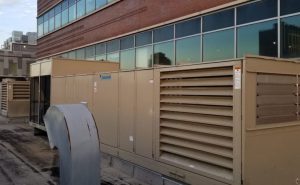What is the Best Type of Air Conditioning System?
When it comes to beating the heat and creating a comfortable indoor environment, air conditioning systems are a must-have for many households and businesses. But with a variety of options available, choosing the best type of air conditioning system can be a daunting task. In this comprehensive guide, we will explore the most popular air conditioning systems, their advantages and disadvantages, and help you make an informed decision that suits your specific needs.
Types of Air Conditioning Systems
1. Central Air Conditioning
Central air conditioning systems are a popular choice for cooling large spaces such as homes, offices, and commercial buildings. They consist of a central unit that cools the air and distributes it through a network of ducts and vents. Here are some key advantages and disadvantages of central air conditioning:

Advantages:
- Even Cooling: Central AC provides even and consistent cooling throughout the entire space.
- Quiet Operation: The noisy components are typically located outside, minimizing indoor noise.
- Improved Indoor Air Quality: Central systems often include air filtration and purification features.
- Increases Property Value: Installing central AC can increase the resale value of your home.
Disadvantages:
- High Initial Cost: Central AC systems can be expensive to install, especially if ductwork is not already in place.
- Energy Consumption: They tend to consume more energy compared to other systems.
- Complex Installation: Installation can be disruptive, requiring professional expertise.
2. Split Air Conditioning
Split air conditioning systems consist of two main components: an indoor unit (evaporator) and an outdoor unit (condenser). These systems are versatile and suitable for both residential and commercial use. Here are some pros and cons of split AC systems:
Advantages:
- Zoning Capability: Split systems allow you to control the temperature in different rooms or zones independently.
- Energy Efficiency: They are generally more energy-efficient than central AC systems.
- Easy Installation: Installation is simpler than central AC, and they can be retrofitted into existing buildings.
Disadvantages:
- Initial Cost: Split systems can be costlier than window units.
- Aesthetic Concerns: The indoor unit may not suit every interior design.
- Regular Maintenance: Periodic cleaning and maintenance are necessary for optimal performance.
3. Window Air Conditioning
Window air conditioners are a popular choice for cooling individual rooms or small spaces. They are self-contained units that are installed in a window or a hole in an exterior wall. Here are the advantages and disadvantages of window AC units:
Advantages:
- Affordability: Window units are often the most budget-friendly option.
- Easy Installation: They can be easily installed by homeowners.
- Portability: You can move them to different rooms as needed.
Disadvantages:
- Limited Cooling Capacity: Window AC units are not suitable for cooling large areas.
- Blocks Windows: Installation blocks the window, limiting natural light and views.
- Higher Energy Consumption: They are less energy-efficient compared to split systems.
4. Ductless Mini-Split Air Conditioning
Ductless mini-split systems are similar to split AC systems but do not require ductwork. They consist of an outdoor condenser unit and one or more indoor air-handling units. These systems offer unique advantages and disadvantages:
Advantages:
- Flexibility: Each indoor unit can be independently controlled, allowing for customized comfort in different areas.
- Energy Efficiency: Ductless mini-splits are highly energy-efficient and can save on utility bills.
- Easy Installation: They are easier to install than central AC, especially in homes without existing ductwork.
- Quiet Operation: Ductless systems are known for their quiet performance.
Disadvantages:
- Initial Cost: They can be more expensive than window units upfront.
- Aesthetic Concerns: Indoor units may not fit seamlessly into every room’s decor.
Choosing the Right Air Conditioning System
The choice of the best air conditioning system ultimately depends on your specific needs, budget, and the size of the space you want to cool. Here are some factors to consider when making your decision:
- Room Size: Consider the square footage of the area you want to cool. Smaller spaces may be adequately served by window or ductless mini-split units, while larger areas may require central or split systems.
- Energy Efficiency: If energy savings are a priority, look for systems with high Energy Efficiency Ratios (EER) or Seasonal Energy Efficiency Ratios (SEER).
- Installation Requirements: Determine if your property already has ductwork in place or if you’re looking for a non-ducted solution. This can significantly impact installation costs and complexity.
- Budget: Your budget will play a significant role in your decision. Consider the upfront costs as well as long-term operating expenses.
- Aesthetic Concerns: If the appearance of the system is important to you, think about how the indoor units will blend with your interior decor.
- Climate: Consider your local climate and how often you’ll need to use the system. Some regions may benefit from more energy-efficient options due to long cooling seasons.
In conclusion, there is no one-size-fits-all answer to the question of the best air conditioning system. Each type of system has its advantages and disadvantages, and the choice should be based on your unique circumstances. It’s essential to weigh factors such as room size, energy efficiency, installation requirements, budget, and aesthetic preferences when making your decision. Consulting with a qualified HVAC professional can also help you make an informed choice and ensure proper installation and maintenance for optimal performance.
By considering these factors and understanding the strengths and weaknesses of each type of air conditioning system, you can create a cool and comfortable indoor environment that suits your needs and preferences. Stay cool and beat the heat with the right air conditioning system for you! https://jbqualityairconditioning.com.au/service-maintenance/



